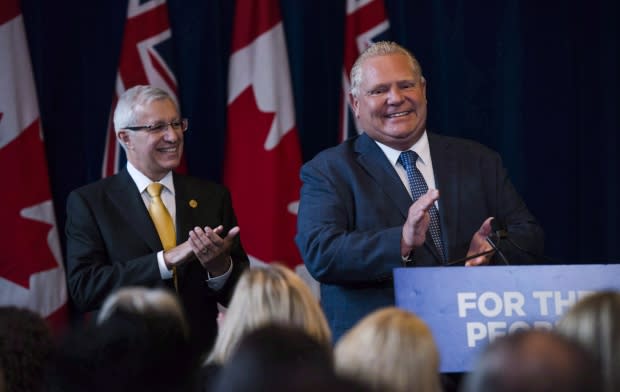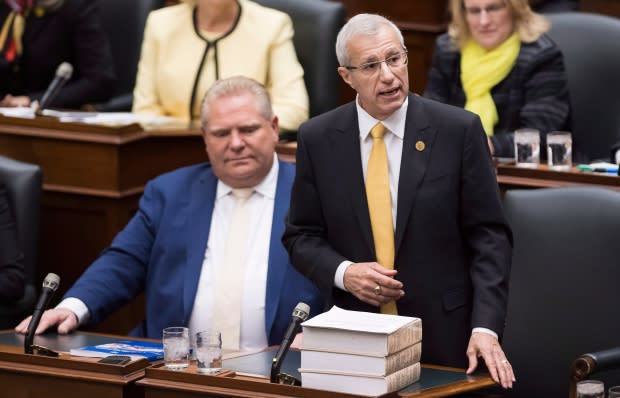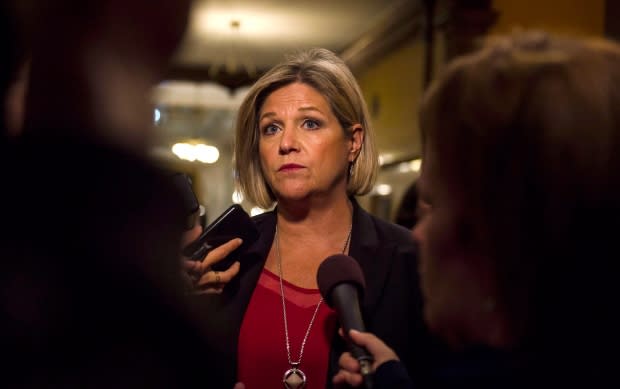Ontario PCs slash spending and oversight, unveil tax cut and new LCBO hours in 1st economic plan
Months after Ontario's finance minister said finding fiscal balance will "require everyone to make sacrifices without exception," the public got its first glance at how the government will try to do it.
Details were laid out in the Progressive Conservative government's fall economic outlook released on Thursday. The strategy includes spending cuts, eliminating several high-profile independent oversight positions, some tax relief for low-income earners and a number of steps aimed at boosting affordability.
"The fiscal hole is deep," Vic Fedeli said in presenting the document to the legislature.
"The road ahead is not an easy one and will require difficult decisions."
Some of the new measures included in the province's plan are:
Tax credit, known as LIFT, for low-income workers earning around $30,000 per year. According to the government, a full-time minimum wage worker would pay no provincial income tax and save as much as $850 each year for a single person or $1,250 for households with two eligible workers. Approximately 1.1 million people will see the benefit, the government said. It is set to take effect on Jan. 1, 2019.
Exempting new rental units from rent control, which the government says will encourage developers to build more affordable housing.
Cutting the number of legislative officers from nine to six. CBC Toronto previously reported that would include the environmental commissioner, child and youth advocate and French language services commissioner positions.
Cancelling a planned surtax on some of the highest earning Ontarians proposed by the previous Liberal government in its last budget that would have generated $275 million in revenue.
Cancelling a proposed French-language university, on top of three other cancelled university satellite campuses in the Toronto area.
Some critics of the PCs move to freeze minimum wage at $14 per hour have said low-income workers would benefit more financially from a wage boost than a tax cut. An independent financial analysis also came to a similar conclusion. Criticisms were amplified by the province's promise and subsequent effort to rollback a suite of labour reforms enacted by the previous regime.
As for the legislative watchdog positions to be cut, their mandates will now be folded into other departments. The attorney general's office and the Ontario ombudsman's office will be granted expanded mandates and more resources to carry them out.
The current environmental commissioner, Dianne Saxe, has been a vocal critic of the PCs actions on climate change, particularly their vow to fight a federal carbon tax, pulling out of more than 700 renewable energy contracts and moving to end the Ontario Green Energy Act.

Furthermore, the current youth and child advocate, Irwin Elman, has published a number of landmark reports that have had considerable impact on child welfare policies in the province. Elman said in a statement issued Thursday afternoon that he only learned of the impending change through media reports.
Speaking to reporters at the legislature, Official Opposition and NDP Leader Andrea Horwath said scrapping the oversight positions is a means of suppressing criticism of the government and premier.
"It seems to me that Mr. Ford doesn't want to be accountable to the environmental commissioner," she said, adding that Premier Doug Ford has been "vindictive" to critics and rivals in the past.
Green Party Leader and MPP Mike Schreiner echoed that sentiment, saying Ford is laying the groundwork for increasingly little oversight of his government.
"They are undermining the checks and balances in a democracy that hold a government accountable."

Populist bent
The economic outlook also indicates that the PCs want to increase the threshold to maintain official party status in Ontario's legislature from eight to 12. In a similar vein, the province plans to end public subsidies for political parties by 2022 — a move that could have financial consequences for parties with only a small presence at Queen's Park.
The PC's economic outlook also included several signature populist commitments.
The government intends to extend hours of LCBO stores, allowing them to sell alcohol between 9 a.m. and 11 p.m. every day of the week. It also committed to developing a plan to bring beer and wine sales to convenience and big box stores.
According to the PCs, Ontario currently faces a $14.5-billion deficit, a figure considerably larger than that reported by the previous Liberal government in its spring budget. The government said it has made progress on cutting the deficit by finding $3.2 billion in efficiencies in operations, including a hiring freeze across the public service.
Liberal Leader and MPP John Fraser alleged in comments to reporters that the PCs are "intentionally inflating" budget numbers to justify steep cuts in the forthcoming spring budget.

"The numbers just don't add up. They don't add up at all," he said.
Though it is spending less, the government said it is also taking in $2.7 billion less in revenue in the fiscal year — including $1.5 billion attributed to the cancellation of the province's cap-and-trade program.
The outlook did not include a projected timeline for a return to a balanced budget.
Focus on Toronto
Ford has spent considerable energy on Toronto-centric initiatives during his time as premier, and the economic preview expanded on that theme.
Legislation tabled alongside Thursday's outlook, Bill 57, includes clauses that dissolve the corporation and public board that currently oversee management of Ontario Place, an underused entertainment venue that sits on prime waterfront real estate. The act would transfer all assets to the Crown.
"Ontario Place has the potential to become a spectacular world-class, year-round destination," the government wrote in the economic preview document.
Horwath, however, said the move could be the first-step toward selling Ontario Place to private interests.

"It will be easier to sell if it is entirely owned by the Crown," she said, adding that the current public board would present an obstacle to doing just that.
Bill 57 also expands the jurisdiction of Metrolinx, the Toronto-area's transportation agency, to include a host of new regions. Further, it eliminates the existing requirement that development plans from Metrolinx must consider all forms of transportation.
The legislation would ultimately give the minister of transportation more control of Metrolinx's governance, and would also allow the minister to appoint a representative to the organization's board of directors.
With files from The Canadian Press

